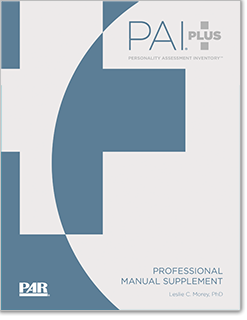
Personality Assessment Inventory [PAI-PAI-PLUS]
Comprehensive assessment of adult psychopathology. PAI Plus is an updated way to interpret PAI data
For Ages: 18 years and older
Administration Time: 25-55 minutes
Format & Scoring: Online administration and scoring in PARiConnect; Software and Hand scored
Author: Leslie C. Morey, PhD
Online Forms, Reports, Kits & e-Manuals
All online resources including Forms, Reports, i-Admins, Kits and e-Manuals.
Printed Forms & Handscoring Materials
Test forms, response booklets and scoring reference manuals.
Printed Manuals
Physical printed manuals.
Books & Workbooks
Click to browse products
Printed Kits
Click to browse products
PAI online i-Admin (each) min order 5
PAI/PAI Plus online Interpretive Report (each) min order 5
PAI/PAI Plus online Score Report (each) min order 5
PAI Law Enforcement, Corrections, and Public Safety Selection Report (each) min order 5
PAI-CS online Interpretive Report (each) min order 5
PAI e-Manual
PAI Plus e-Manual Supplement
PAI Law Enforcement, Corrections, and Public Safety Selection Report e-Manual
PAI-CS Module Professional e-Manual
PAI Hand Scorable Answer Sheets (25)
PAI Hardcover Item Booklet – Reusable
PAI Softcover Item Booklets (10) – Reusable
PAI Plus Item/Response Booklets (25)
PAI Law Enforcement, Corrections, and Public Safety Selection Report Item/Response Booklets (25)
PAI-CS Module Item/Response Booklets (25)
PAI Critical Items Forms (25) – Revised
PAI Profile Forms (25) – Revised
PAI Structural Summary Forms – Revised (25)
PAI Professional Manual, 2nd Edition
PAI Plus Manual Supplement
PAI Law Enforcement, Corrections, and Public Safety Selection Report Professional Manual
PAI-CS Module Professional Manual
PAI Administration Folio
PAI Casebook for the PAI
PAI Interpretive Guide to the PAI
PAI Audio Administration – CD ROM
PAI Comprehensive Kit
PAI Casebook and Interpretive Guide Kit
The PAI assesses psychopathological syndromes and provides information relevant for clinical diagnosis, treatment planning, and screening for psychopathology. Administration time is up to 40 minutes shorter than that for similar instruments.
Features and benefits
- Unique, efficient scale structure. All 22 scales are nonoverlapping, promoting high discriminant validity. Scale development was content-driven.
- Fast, cost-effective administration. Clients generally complete the 344 items in less than an hour. Scales and subscales can be hand-scored in only 15-20 minutes.
- Can be used with low-reading level populations. The PAI requires only a fourth-grade reading level; an audio administration CD is also available.
- No scoring keys needed. A two-part carbonless Answer Sheet provides scores for all 344 items.
- Provides strategies for interpretation. The Professional Manual includes an expanded discussion of administration considerations and a variety of strategies for the interpretation of clinical data.
- Portable materials. The PAI Administration Folio provides a hard surface for both the Item Booklet and Answer Sheet for situations in which no desk or tabletop is available.
- Available 24/7. Administration and scoring are available 24/7 on PARiConnect, our online assessment platform.
Supplemental components make PAI use even easier
- PAI Item and Response report. Provides item information including item numbers, item text, and client responses after generating a score or interpretive report. Information is presented by scale/subscale, providing valuable context for individuals’ item responses.
- PAI Audio Administration CD-ROM. For individuals who have limited reading skills or who might otherwise benefit from an audio presentation of the PAI. The CD includes a 7-second delay for each item to allow the client to mark his or her response on the PAI Hand-Scorable Answer Sheet.
- An Interpretive Guide to the Personality Assessment Inventory (PAI). PAI author Les Morey has consolidated the results of clinical and empirical observations into a volume that provides additional insight into PAI interpretation.
- Casebook for the Personality Assessment Inventory (PAI): A Structured Summary Approach. This book includes 26 case studies reflecting a wide range of diagnoses based on profile data acquired during a 10-year period.
PAI Plus update
PAI Plus Includes a Score Report and Clinical Interpretive Report Based on New Developments Since the PAI was Introduced. The PAI Plus takes the existing PAI items and gives users an updated way to interpret the data. Using the PAI, an objective inventory of adult personality, the new report offers:
- DSM-5® update: Updated diagnostic possibilities align with the criteria.
- Alternative Model Profile: An optional new profile scores in accordance with the Alternative Model for Personality Disorders.
- Additional supplemental indices: Based on years of academic research, 15 new supplemental indices provide additional profile information related to negative and positive distortion and random responding. Supplemental clinical indicators provide profile information related to suicidality, aggression, level of care, presence of ADHD, and more.
- Context-specific norm groups: Including profile overlays for bariatric surgery candidates, child custody evaluations, chronic pain patients, college students, deployed military, egg donors/gestational carriers, motor vehicle accident claimants, police applicants, and potential kidney donors. This profile is overlayed onto the examinee’s profile to allow for comparison.
- Updated report: An updated look and feel create a streamlined and modern-looking report.
Features and benefits
- The PAI Plus Clinical Interpretive Report on PARiConnect offers enhanced report features such as visual and text displays of full scale and subscale means and standard deviations for selected context-specific norm groups; NIM/PIM predicted profile overlays and NIM/PIM-specific profiles (if applicable); additional profiles overlays for cluster profiles as well as various diagnostic, symptom behavior, and response set groups; and a new table of contents that hyperlinks to sections of the report for ease of navigation.
- Now available, the PAI Item and Response report provides item information including item numbers, item text, and client responses after generating a score or interpretive report. Information is presented by scale/subscale, providing valuable context for individuals’ item responses.
- PAI Software Portfolio (PAI-SP) users can get PAI Plus Software Upgrade
- The PAI Plus Manual Supplement details the research, theory, and development behind the PAI Plus and only covers additions in this report. Purchase of the PAI Professional Manual, 2nd Ed. is also recommended.
PAI® Law Enforcement module
PAI® Law Enforcement, Corrections, and Public Safety Selection Report™ screens public safety job applicants
Screen Your Law Enforcement Clients for Fitness for Duty
This module helps you screen public safety job applicants, current public safety employees, probation officers and parole officers who are referred for psychological evaluation for mandated fitness for duty, weapon carrying screening, and a variety of special unit assignments (e.g., SWAT, hostage negotiation).
Features and benefits
- Profiles compare the applicant’s scores with those of the PAI community sample and approximately 18,000 police and other public safety applicants, either as a whole or by gender and ethnic group.
- Additional profiles contrast the applicant’s scores with norms from a group of applicants in four job classifications (police officer, communications dispatcher, corrections officer, and firefighter/EMT) who completed at least 1 year in that position.
- Reports can be generated from on-screen administrations of the PAI or hand-entry of PAI item responses from the Item/Response Booklet.
- Now available, the PAI Item and Response report provides item information including item numbers, item text, and client responses after generating a score or interpretive report. Information is presented by scale/subscale, providing valuable context for individuals’ item responses. Available on PARiConnect.
Note: Customers planning to use the on-screen administration feature of this module must also purchase PAI-SP Counter Serial Number uses.
PAI-CS Module
PAI® Interpretive Report for Correctional Settings™ assesses offender misconduct risk, psychological needs, and rehabilitation
Generate an Interpretive Report to Identify Offenders’ Risk of Misconduct
This PAI Module enables correctional psychologists and staff to generate an interpretive report that identifies offenders’ risk of institutional misconduct during incarceration, describes offenders’ psychosocial needs, and estimates how offenders are likely to respond to incarceration and rehabilitative programs.
Features and benefits
- A Staff Management Summary provides an integrated summary of the offender’s PAI profile in terms of his or her specific psychological functioning and institutional management factors.
- Profiles contrast the offender’s test scores with those of (a) the PAI community sample, (b) approximately 1,200 incarcerated offenders from multiple correctional facilities around the country, and (c) offenders of the same gender.
- The Addictive Characteristics scale helps identify individuals at risk for substance use problems; three validity scales aid in identifying location-specific random responding and help identify inconsistent responding that is specific to correctional settings.
- The PAI-CS interpretive report can be generated from on-screen administration of the PAI or hand-entry of PAI item responses from the Item/Response Booklet.
- Now available, the PAI Item and Response report provides item information including item numbers, item text, and client responses after generating a score or interpretive report. Information is presented by scale/subscale, providing valuable context for individuals’ item responses. Available on PARiConnect.
Technical information
Note: Prior installation of the PAI-SP (V.3.0 or higher) is required. Customers planning to use the on-screen administration feature of this module must also purchase PAI-CS Counter Serial Number uses.
- Internal consistency estimates for the clinical scales range from .82 to .92 in the corrections normative sample, from .74 to .94 in the community normative sample, and from .82 to .94 in the clinical sample.
- Test-retest correlations of the clinical scales range from .79 to .92 in a combined sample (N = 155) of community-dwelling adults and college students.
Online administration in PARiConnect
Leading the way in online assessment. In January 2013, PAR launched their new online assessment platform called PARiConnect. For over ten years, it is one of the most popular platform in the online assessment industry. Updated with features customers asked for, adding trustworthy instruments, PARiConnect remains in-demand-feature in the decades to come.
Why use the PAI Plus online
- Flexible administration options
- Powerful report options
- Client-centric design
- Reliable verification tools
- Easy and affordable purchase options
- Adaptability for any type of organisation
- Strict data security
- Simple technical requirements
- Enterprise manager
PAA Scoring Bureau Services
Psychological Assessments Australia (PAA) provide a Report Scoring Bureau Service for practitioners. Our scoring bureau fee is charged per report, in addition to the cost of the report requested.
We offer two levels of Scoring Bureau Services:
- Standard Service – reports will be scored and returned within a 24-hour turnaround period from receipt. We will use this level of service unless a rush service is requested.
- Rush Service – reports will be scored and returned within a 2-hour turnaround period from receipt.
Simply scan and e-mail your client’s completed answer sheet to PAA for scoring. Nominate the type of report you would like generated from the range of reports available. Your report will be scored and returned to you by e-mail. You will be charged for the cost of the report, plus the nominated Scoring Bureau Fee (per report).
See prices and download the PAA Scoring Bureau Service Form for your convenience.
Sample Reports
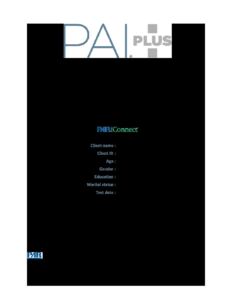 PAI_Plus_Score_PiC
PAI_Plus_Score_PiC![]() Download
Download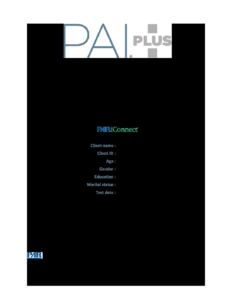 PAI_Plus_Interpretive_PiC
PAI_Plus_Interpretive_PiC![]() Download
Download![]() Sample PAI PARiConnect Score Report
Sample PAI PARiConnect Score Report![]() Download
Download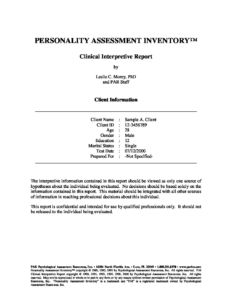 PAI Clinical Interpretive Report
PAI Clinical Interpretive Report![]() Download
Download![]() Sample PAI PARiConnect Clinical Report
Sample PAI PARiConnect Clinical Report![]() Download
Download![]() Sample PAI PARiConnect Correctional Report
Sample PAI PARiConnect Correctional Report![]() Download
Download![]() Sample PAI PARiConnect Law Report
Sample PAI PARiConnect Law Report![]() Download
Download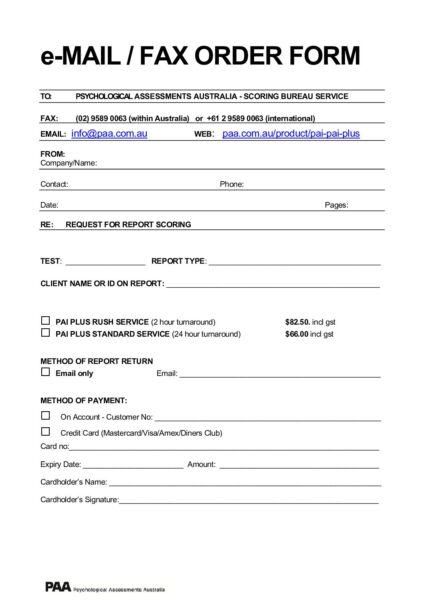 PAA Scoring Bureau Order Form – 2024
PAA Scoring Bureau Order Form – 2024![]() Download
Download
 NZ
NZ




